|
|
|
Sort Order |
|
|
|
Items / Page
|
|
|
|
|
|
|
| Srl | Item |
| 1 |
ID:
100532
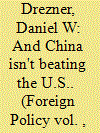

|
|
|
| 2 |
ID:
128520
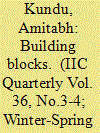

|
|
|
| 3 |
ID:
121228
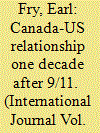

|
|
|
|
|
| Publication |
2012.
|
| Summary/Abstract |
The decade since the events of 11 September 2001 was difficult for the United
States. The nation endured its worst recession since the Great Depression
during the period from December 2007 to June 2009. Many Americans
suffered through a "lost decade," with fewer non-farm payroll jobs in
November 2011 than at the beginning of 2001.1
Median real household
income was also higher in 2001 than in 2011.
|
|
|
|
|
|
|
|
|
|
|
|
|
|
|
|
| 4 |
ID:
118401
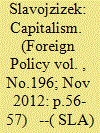

|
|
|
| 5 |
ID:
097863


|
|
|
| 6 |
ID:
126436
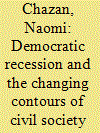

|
|
|
|
|
| Publication |
2012.
|
| Summary/Abstract |
Civil society in Israel has emerged not only as the key victim of the democratic recession currently engulfing the country, but also as the main source of its democratic promise. There is a direct correlation between the intensified efforts of neo-nationalist groups to curtail civil society and its increased centrality as the locus of the ongoing struggle for the assurance of a just, egalitarian and pluralistic Israel.
This essay briefly surveys the emergence of civil society in Israel and its characteristics; it then analyzes recent attacks on civil society organizations and consequent shifts in its structure and activities. On this basis it discusses some of the implications of Israel's present democratic crisis and seeks to reassess the outlook for democratic durability in the country. The main contention of this analysis is that there is a close connection between the vibrancy of Israeli civil society and its democratic resilience. Today, Israel's reactivated civic sector stands as the last bastion between an ultra-nationalist takeover and democratic survival.
|
|
|
|
|
|
|
|
|
|
|
|
|
|
|
|
| 7 |
ID:
119160


|
|
|
|
|
| Publication |
2013.
|
| Summary/Abstract |
The demographic dividend, that is, the growth of the working age population aged 16 years relative to younger and older age dependents, has often been cited as a crucial component of the accelerated economic growth experienced by disparate countries and regions at different points in time. Generally less emphasized are the ramifications of this process when it occurs in reverse; that is, when the relative size of the working age population begins to shrink. Related to this is the more subtle effect of changes to the age structure of the overall working age population, which can have compounding or offsetting effects in relation to the demographic dividend noted above. This paper explores how these age-related phenomena were instrumental to both the Great Depression and the Great Recession of 2008. We explore how the generational composition of economic actors and the aging of the baby-boom worker may have played a role in provoking these remarkable recessionary periods. The reversal of the demographic dividend and the aging of the working age population are factors now contributing to the propagation of the global economic downturn, as witnessed in the example of Japan over the past half-century. This paper applies the lessons of the Great Depression to offer a forward-looking analysis of the Chinese economy. China is on the precipice of a significant demographic shift whose implications for economic growth are explored.
|
|
|
|
|
|
|
|
|
|
|
|
|
|
|
|
| 8 |
ID:
144821
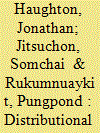

|
|
|
|
|
| Summary/Abstract |
This paper explores the extent measures taken by the government of Thailand helped households cope with shocks caused by the 2009 recession. A counterfactual was created by: quantifying the effects of the shocks (to tourism and exports); applying a Social Accounting Matrix multiplier analysis to simulate the indirect and induced effects; and mapping the sectoral changes to household incomes using data from the Socio-economic Surveys. The effects of the stimulus package introduced in early 2009 were then superimposed on the effects of government spending. The shocks alone would have directly reduced labour income by 2.1 per cent, or by up to 7.8 per cent if indirect and induced effects were included. Government measures raised household incomes by about 0.9 per cent on average, offsetting the shocks to some extent. The measures especially helped poorer households. On average, those in the lowest decile and those living in rural areas gained.
|
|
|
|
|
|
|
|
|
|
|
|
|
|
|
|
| 9 |
ID:
105866
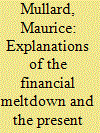

|
|
|
|
|
| Publication |
2011.
|
| Summary/Abstract |
he concern of this article is to locate the unfolding literature that seeks to explain the present financial crisis into three dimensions of contestability. The major areas of disagreements between various authors include: the role of government; the issues of whether the recession was unavoidable or whether it was inevitable; and the area of ideas and ideals and how economic ideas shaped and influenced the policy process. These explanations include the pragmatists and all that literature that had a time dimension of major actors trying to produce policies that aimed to stabilise the financial markets. These policy makers did not have the benefit of hindsight but were concerned that the financial markets were so fragile that there was no other choice but for governments to intervene. By contrast, there were the market fundamentalists who argued that the pragmatists had got it wrong and were therefore highly critical of the Federal Reserve and the Treasury and tended to blame the recession on government housing policy. Institutionalists have argued that the regulatory system is broken, while structuralists tend to focus on growing income inequalities, the concentration of wealth and how the changing structure explains the recession in the sense that households took the avenue of higher debt on their homes to sustain higher levels of consumption. Finally, there is the Keynesian Collectivist argument that points to the limits of Rational Expectations and Efficient markets. No one really know who is right, but the fierce debate that is emerging is highly important in that each explanation seeks to provide a framework for policy making
|
|
|
|
|
|
|
|
|
|
|
|
|
|
|
|
| 10 |
ID:
118405
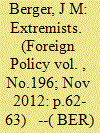

|
|
|
| 11 |
ID:
129057
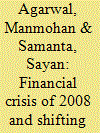

|
|
|
|
|
| Publication |
2014.
|
| Summary/Abstract |
This article analyses shifts in economic power over the last five decades or so. While developing countries (DCs) and regions have increased their share of incremental world income and incremental world exports over this period, there is very little shift in the relative rankings according to size of GDP of the 25 largest economies in 2011. The economies of South Korea and Brazil have become relatively much larger; the other changes have been minor. The correlations between the ranks over the years are very large showing that there has been little change in the rankings. Also, the GDP and per capita GDP of other countries and regions have increased relative to the US but this increase has been slow, particularly after 1982. The GDP of most of the large DCs has increased relative to that of the US but far fewer have increased their relative per capita GDP suggesting slow rates of growth of productivity and limited structural change of shift in economic activity from low productivity to high productivity sectors. Aggregating 20 indicators to form an index of economic power, we find that there has been little change in the rankings according to this index. Further, measuring the distance of individual countries from the US on the basis of these indicators, we find that most countries have been converging on the US, but very slowly. There is no evidence that the 2008 financial crisis has resulted in a hastening of the decline of the US.
|
|
|
|
|
|
|
|
|
|
|
|
|
|
|
|
| 12 |
ID:
128580
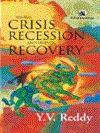

|
|
|
|
|
| Publication |
New Delhi, Orient Blackswan Private Limited, 2011.
|
| Description |
xxv, 421p.Hbk
|
| Standard Number |
9788125041856
|
|
|
|
|
|
|
|
|
|
|
|
Copies: C:1/I:0,R:0,Q:0
Circulation
| Accession# | Call# | Current Location | Status | Policy | Location |
| 057666 | 330.90511/RED 057666 | Main | On Shelf | General | |
|
|
|
|
| 13 |
ID:
093368
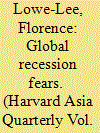

|
|
|
| 14 |
ID:
097228
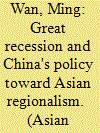

|
|
|
| 15 |
ID:
099441
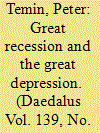

|
|
|
| 16 |
ID:
118400
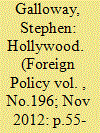

|
|
|
| 17 |
ID:
118230
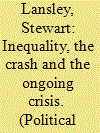

|
|
|
|
|
| Publication |
2012.
|
| Summary/Abstract |
The rise in inequality across many rich nations, but especially in the United Kingdom and the United States, was meant to lead to a bigger economic pie from which all would benefit. In fact, the increased concentration of income over the last three decades has led to more fragile and unstable economies making it a key cause of the 2008 Crash and today's lack of recovery. The evidence of the last 100 years is that models of capitalism that fail to share the proceeds of growth more evenly will eventually self-destruct. More equal societies have softer business cycles. In contrast, more unequal economies are associated with more extreme cycles-they have exaggerated booms, deeper falls and extended troughs. The scale of inequality is not just an issue about fairness and proportionality, it is therefore integral to economic health.
|
|
|
|
|
|
|
|
|
|
|
|
|
|
|
|
| 18 |
ID:
121589


|
|
|
|
|
| Publication |
2013.
|
| Summary/Abstract |
Even before the sharp downturn that began in 2007, many Americans were concerned about economic risks. Yet this widespread public concern has not been matched by attention from political scientists regarding how citizens experience and understand the economic risks they face or how those experiences and understandings shape their views of public policy. We develop here an argument about the role of personal economic experiences in the formation of policy attitudes that we validate using a distinctive opinion survey of our own design, fielded not long after the onset of the Great Recession. The survey tracks citizens' economic experiences, expectations, and policy attitudes within multiple domains of risk (employment, medical care, family, and wealth arrangements). These investigations show that economic insecurity systematically and substantially affects citizens' attitudes toward government's role. Citizens' economic worries largely track exposure to substantial economic shocks. Citizens' policy attitudes in turn appear highly responsive to economic worries, as well as to the experience of economic shocks-with worries and shocks creating greater support for government policies that buffer the relevant economic risk. Attitudes seem most affected by temporally proximate shocks, shocks befalling households that have weak private safety nets, and shocks occurring within the domain most relevant to the policy in question, though attitudes are also (more weakly) correlated with shocks in other domains. The magnitude of these associations rivals partisanship and ideology and almost always exceeds that for conventional measures of socio-economic status. Given the long-term increase in economic insecurity and current sluggish recovery, understanding how insecurity shapes citizens' policy attitudes and political behavior should be a major concern of political science.
|
|
|
|
|
|
|
|
|
|
|
|
|
|
|
|
| 19 |
ID:
180724
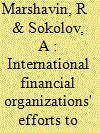

|
|
|
|
|
| Summary/Abstract |
THE STATE of the global economy even before the coronavirus pandemic was cause for major concern. In 2019, according to the International Monetary Fund (IMF), global GDP and global trade recorded their lowest growth of the decade (2.9% and 0.3%, respectively). Global debt continued to increase, with sovereign debt and budget deficit levels in many countries near critical.
|
|
|
|
|
|
|
|
|
|
|
|
|
|
|
|
| 20 |
ID:
107933
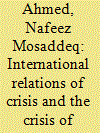

|
|
|
|
|
| Publication |
2011.
|
| Summary/Abstract |
The twenty-first century heralds the unprecedented acceleration and convergence of multiple, interconnected global crises - climate change, energy depletion, food scarcity, and economic instability. While the structure of global economic activity is driving the unsustainable depletion of hydrocarbon and other natural resources, this is simultaneously escalating greenhouse gas emissions resulting in global warming. Both global warming and energy shocks are impacting detrimentally on global industrial food production, as well as on global financial and economic instability. Conventional policy responses toward the intensification of these crises have been decidedly inadequate because scholars and practitioners largely view them as separate processes. Yet increasing evidence shows they are deeply interwoven manifestations of a global political economy that has breached the limits of the wider environmental and natural resource systems in which it is embedded. In this context, orthodox IR's flawed diagnoses of global crises lead inexorably to their 'securitisation', reifying the militarisation of policy responses, and naturalising the proliferation of violent conflicts. Global ecological, energy and economic crises are thus directly linked to the 'Otherisation' of social groups and problematisation of strategic regions considered pivotal for the global political economy. Yet this relationship between global crises and conflict is not necessary or essential, but a function of a wider epistemological failure to holistically interrogate their structural and systemic causes.
|
|
|
|
|
|
|
|
|
|
|
|
|
|
|
|
|
|
|
|
|